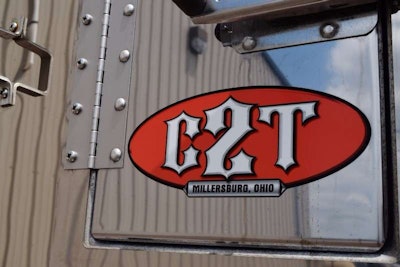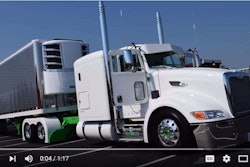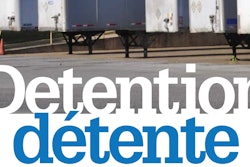
Rod Miller’s 22-truck Chance 2 Transport fleet hauls garage doors for a direct customer as well as brokered cheese in reefers out West, bringing produce back to the Ohio region. Miller’s sons have taken a lot of rein in the back office, allowing him to get into the company flagship Peterbilt and work on the front lines of detention management.
 Small fleet owner Rod Miller and his Chance 2 Transport 2014 Peterbilt 389 glider — find a video interview with Miller about the trophy-winning rig at this link.
Small fleet owner Rod Miller and his Chance 2 Transport 2014 Peterbilt 389 glider — find a video interview with Miller about the trophy-winning rig at this link.A recent load to Denver illustrates what the fleet deals with not only in that most notorious of detention-prone facilities, the grocery warehouse, but also on multiple-drop loads.
Miller loaded garage doors for drops around Denver. He had five drops scheduled for a Thursday on the way out, all hand-unloads. But the first took an hour too long, the third put him an additional two hours late, and he “couldn’t get to the last two drops in time.”
They had to be rescheduled for Friday. Luckily, the contract with the shipper includes a detention rate of $75 an hour after a specific time for unload per unit of freight, the latter defined by the shipper. Layover pay – payable in this case given the extra day for unload – of $125 also applied. All told, Miller was looking at an extra $350 to compensate for the delays.

On the return trip hauling potatoes to Kroger in Delaware, Ohio, he hit the real detention wall. “If you need a 10-hour break at the place you’re delivering, that’s a good place to go,” he says. “There were 27 trucks waiting for 10 doors” at the facility.
Conversations ensued as Miller waited with the Kroger representative at the facility. He relayed an anecdote that illustrated for her, he hoped, what the facility’s problems meant for his fleet: “We had a deal with Meijer’s at a distribution center near Dayton – drivers would sit there for hours and hours to the point they wanted to quit. We told the broker, ‘Don’t load us with Meijer’s.’ I told the broker I wasn’t going to haul it anymore. I hoped I didn’t mess myself up, but you know what? They’re still in business, and I’m still in business.”
Sometimes, he adds, problem facilities just have to be cut off. The more trucking companies do so, the more a shipper’s related issues are likely to compound as facilities deal with increasingly upset haulers.
The whole situation at Kroger was time-stamped in and out of the gate, he says, just shy of a 10-hour break.
“My overall feeling is we’re fortunate” with most direct non-broker customers, Miller says. “If I call them up and tell them something, they believe us. We try to be fair on the other end. We help unloading and get compensated for that, too. And if the driver wasn’t helping here or there, or if I go in and we help and it takes 10 minutes, I’m not going to bill them for that.”
Unlike at Cadle Trucking, where such extremes in detention times are not the reality, Miller’s detention pay policy for drivers is not guaranteed but rather to pay $20-$25 an hour if the fleet collects it from the customer.
In establishing rates with customers, Miller takes into consideration revenue per mile minus fuel cost. Beyond a reasonable unload time, he sees $100 an hour as a fair rate, which he strives for if he thinks he can get it. Ultimately, like others, he’s hopeful situations like his own at Kroger improve prior to any mandate for electronic logging devices, which he believes will necessitate greater rigidity in drivers’ scheduling. “Once we have to put recorders in the trucks, somebody will have to step up,” he says, and improve such situations.
Miller, meanwhile, does what he can to provide a remedy. At problem locations, his place behind the wheel has helped. “When I go out to customers, I can usually straighten things out pretty quick,” he says.










